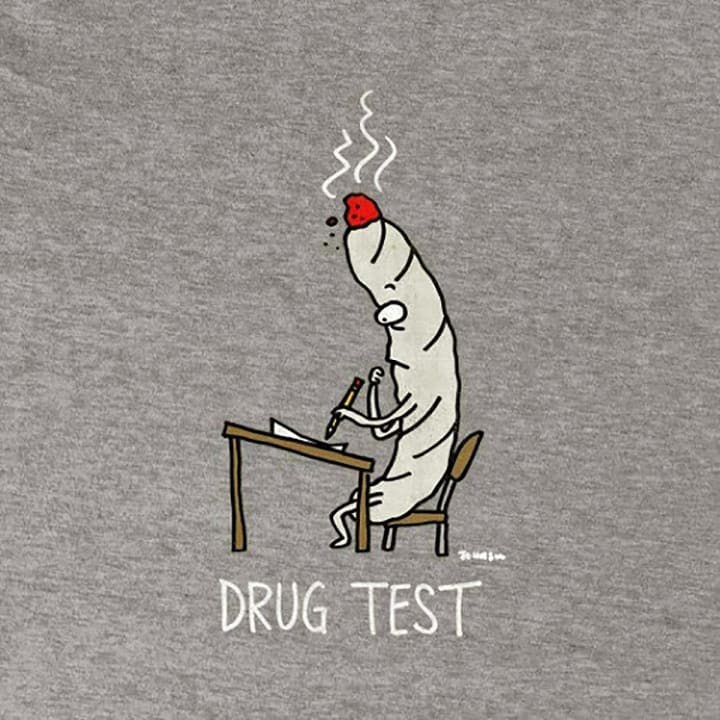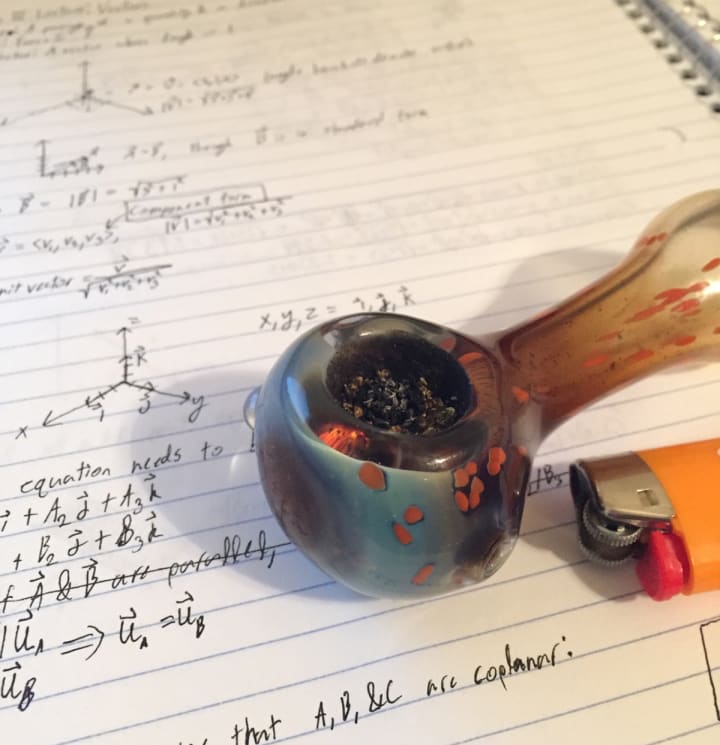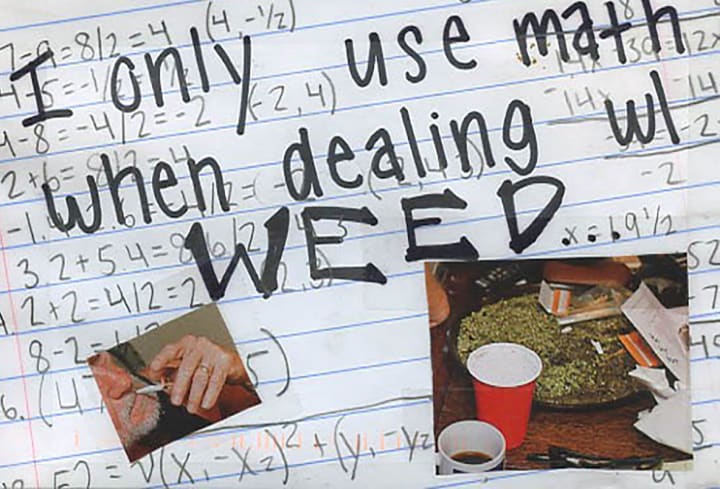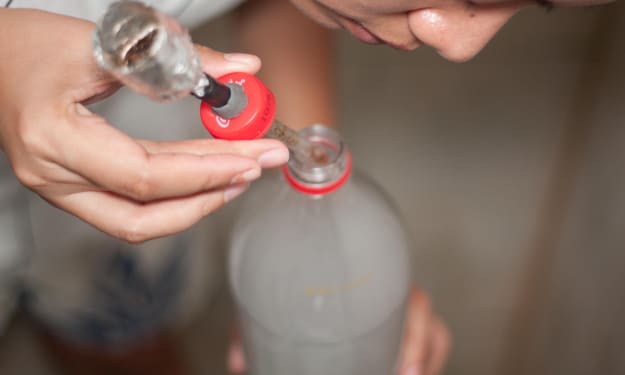Do Stoners Make Better Students?
Many potheads are going to HIGH-end careers, which has us wondering, 'do stoners make better students?'

The effects of marijuana on grades? For the many years it has been reliably reported from scientist after scientist that marijuana has definite, and often dramatic effects on the thinking process. It may not be physically damaging, but can a student study economic theory through the plexiglass-solid high from sinsemilla buds? Maybe a zen master can, but aside from the raja yoga students and the other mind-control heavies, who's going to make it through organic chemistry when the hash hits town? The connection between marijuana use and poor school performance has always been assumed by most educators; chronic marijuana users all dropped out and became street sweepers. Isn't it obvious?
It seems obvious, except no one remembers having seen any recent studies done in that area.
Researching Research

Image via Tumblr
After leafing through a number of bibliographies, we managed to track down a few papers that contained the information which we were looking for. "Drug Use and Grades in College” is a 1971 study done at the Stony Brook campus of SUNY. Another is a much larger study done over a three-year period between 1969-71 at UCLA in California. Ten percent of the UCLA student body were in on this one. Also, in 1971, a doctor at the Stamford Medical School surveyed four major medical schools to determine the amount of marijuana being used.
While we were checking for these reports we began to check through the newspaper accounts dealing with marijuana during the same time period as the studies to see how the press handled the results. There was practically nothing. This made no sense at all. Almost any interesting marijuana study makes it to the press before long. A study on the effect of marijuana and grades isn't a neutral sort of thing, no matter what the results are. If there was a connection between dope smoking and low grades, the anti-marijuana press would have headlined it for days. If the results had gone in the other direction, not only would have the legalization groups waved it about, but it would doubtlessly have led to further research. And yet almost all the work had been done in one three year period, and somehow done quietly enough that nobody was really aware of it. You can't suppress news, and any result of these studies would have been news. There would have been other researchers who would want to carry it a little further. And there would be more studies.
Scholarly Stoners

Image via Tumblr
Nothing gets suppressed in the scientific community when it comes to marijuana research; there's a tremendous amount of information available to anyone with a stack pass at a good medical library. The only reason a lot of marijuana studies never get reported in the popular press is that they're so incredibly dull. You can read for pages and end up knowing a very great deal about the amount of THC necessary to prevent a rat from flicking his tail. Tests which either strengthen or hurt a long-held marijuana myth, however, usually get a great deal of publicity, no matter how obscure the results. We half expected that that bound volume of the journal would be mysteriously missing when we finally got down into the periodical collections.
But all three studies were there. All the data was there; pages of it. And it seemed to be the same story each time. The Stony Brook study was the smallest in terms of the number of students who were included in the testing and interviewing, but the researchers came to a very solid conclusion: "Thus it seems that the harder drugs are associated with low grades, but that marijuana has no impact at all on grades." No impact at all. We turned next to the UCLA study, a huge $250,000 per year report that went on for three years. Their verdict was even more explicit. "We found no statistically significant differences in the academic performance, in either high school or college, or users and nonusers of marijuana, even among daily smokers. Among the UCLA college students surveyed, frequency or duration of marijuana use, up to daily frequency, did not appear to affect the ability or the desire to obtain high grades." The addition of that "or the desire” was especially significant; what had happened to the old “amotivational syndrome” and the stoned-out drop out?
If marijuana smokers could do that well in college, they'd be a cinch to get into good graduate schools. And apparently they have been for years, because the medical school’s study was done the same year and over half the medical students reported that they had smoked marijuana. And they had no intentions of stopping. The only situation which the mellow medics saw getting in the way of their therapeutic use of the herb was if further research proved that marijuana was as bad as tobacco. Then they might quit. The doctors who conducted the survey were obviously impressed. "We the authors," they concluded, "generally agree with the students we surveyed, and strongly disagree with the position of established medicine concerning the use of the drug. ... If medical authorities cannot convince medical students to refrain from using marijuana, persuading the public at large seems unlikely. If medical students, with their excellent intelligence, cannot be convinced, it behooves medical educators to wonder why. Perhaps students and educators have something to learn, and something to teach."
Successful Stoners

Image via Tumblr
The marijuana revolution has been over for years; those turned-on graduate students are out there moving the wheels now. No, Mr. America, not all marijuana smokers become dishwashers. Some become corporation presidents, top attorneys and brain surgeons. No wonder weed prices are skyrocketing and the busts getting bigger; the lawyers and the doctors are buying it at premium prices, and the business graduates are probably the sneaky bastards who have been whipping up those counterfeit Thai sticks. Maybe this was the reason nobody had made much noise about those studies.
Besides the results, there was a wealth of additional information provided in the studies. And we wondered why the results were never made public. We traced the research coordinator of the UCLA study to his current office in Santa Fe, New Mexico. He was well aware of the lack of publicity given the findings he and his colleagues had reported. Among other things, he told us that the funding had been suddenly cut off just as the first results were being released. “It was an embarrassing study,” he admitted. Almost single-handedly, he had gotten massive amounts of data on thousands of students transferred onto reels of tape, and was currently in the midst of analyzing the results of a study done years ago. His group at UCLA had been funded during the years they had collected, but had lost the funding for the data interpretation. This left more than two years worth of carefully collected data which had never really analyzed-a terrific waste of money, he felt. "We were only funded for one year," he added, "and those results alone provided enough information for 23 articles, and a book." The report we had read that mentioned school grades was just a small part of a huge mass of information which is still to this day unpublished, many years after the study was completed.
The whole thing was beginning to look fishy again. Why was government money being pulled out of studies which came up with results like that? Some researchers had privately complained that they couldn't get funded or that it was a grade-A hassle to get the correct permits to do the research, but we never had the feeling that it was more than standard that it was government-methodically bureaucratic systems which caused the delays.
Paging Dr. Zinberg

Image via Tumblr
Just to reinforce a hunch, we placed a call to Dr. Norman Zinberg. Dr. Zinberg, who was involved with research into possible medical uses of marijuana, was a nationally respected authority in the field of drug use and abuse. He was also a pioneer in his field. It was his study of the effects of marijuana on human volunteers, a project proposed by his student and collaborator, Dr. Andrew Weil, which became the first of the recent flood of psychological research studies involving humans rather than laboratory animals. His response was sanguine about studies on academic performance. "They weren't finding out anything new or interesting,” he said, "so they just stopped research into that area after a little while.” We protested that we thought the results were very interesting, but he continued: "You can't get interesting work funded very easily. The government agencies which support this sort of research are very concerned about the methodology you use, and the restrictions can be very frustrating. They like hard, quantifiable results. Those surveys don't lend themselves to hard and clear conclusions about actual effects of marijuana.”
The government doesn't like foggy answers; for that matter, most researchers don't like them either. The great majority of those projects involving marijuana which have been published in professional journals are very specific studies which, in limiting their scope, have been able to provide very accurate figures. Studying a person taking a simulated driving or flying test indicates the effects of marijuana on one complex task, but it still doesn't provide any insight as to exactly what the THC is doing in the brain. When it comes to an area as complicated as the tremendous numbers of variables which could affect school performance, things get very foggy very quickly. No effect on grades may be something interesting to a lot of students, but to scientists, it signals a dead end. There aren't any solid yesses or nos. It's not that marijuana is good, or bad, for grades-it doesn't seem to have any effect at all. And "no effect” doesn't really leave you much to study the next time around. After a while, people stop barking up the tree and begin to look into new areas like long-term chronic usage, or various studies on medical possibilities. The studies were done, the findings reported in the professional journals, and that was about as far as it went.
Mixed Results

Image via CoEd
Returning to the figures and percentages from the various studies, it soon became clear why nobody had been that interested in following them up. The results were all over the map: there seemed to be no clear pattern at all.
In the UCLA study, the heavy smokers had the lowest grade-point averages and, yes, more dropped out than in any other category. Those who returned to college, however, did just as well as their peers. If you don't want to study, it would seem, you can go smoke dope, but if you change your mind and come back to hit the books, your smoking habits aren't going to keep you off the dean's list. In the same study, the highest averages were achieved by the "occasional' smokers.”
This finding was duplicated in the Stony Brook study. Again, the highest grades were being achieved by the "casual' smokers. The "once-a-day' smokers didn't do as well. But to keep things confusing at Stony Brook, the "once-a-day' heavy smokers had grades as high as the “total abstainers.”
Marijuana use begins to look about as relevant to grades as pinball: if you spend all your time at it, you'll do poorly in school. If you keep your use temperate, you'll do just fine. But even if you smoke daily, you'll do no worse than those who don't smoke no marijuana.
This last result does look a little peculiar until you study the UCLA report a little more closely. Although marijuana had no measurable effect on grades, 89 percent of the stable marijuana users (those who consistently smoked the same amount, whatever quantity) reported that they felt that their marijuana use had helped them at college. Perhaps it had. The “total abstainers” turned out to be the sort of people who didn't drink either, individuals considered somewhat out of step with their fellow students.
It is true that being too concerned about grades can damage performance, and the researchers suggested that “...marijuana use may alter achievement only marginally, so that middle-class persons, who are experiencing persistent anxiety and ‘over motivation,' become less so through their use of marijuana and then function effectively within the socially functional range of performance.' “
In a simpler vein, a lot of people who might have worried themselves to death about grades and done worse, smoked a bit, mellowed out instead, and did better. Total abstainers may represent a group higher than most in "over motivation” -a sort of “over motivational syndrome” reverse to the old "amotivational syndrome.”
Ganja's Effect on Grades

Image via Tumblr
And over and over again-no effect on grades. Smoking, not smoking, smoking a little, smoking a lot, some, more, sometimes, never, English majors, Psychology students, musicians, engineers-the grade distributions kept averaging out the same whether or not there was a stash behind the textbooks or a water pipe on the desk. More tables, more numbers, more percentages; no effect. No impact. No significant differences.
There wasn't any mystery to it; if there was, it has been over for many years. The studies had been done, reported in the journals, and that was about the end of it. If there had been something dramatic to show on the first go-round, there would have been a reason to narrow down the study for a second go; but all there were were rather "soft” survey-type studies coming up with results that only pointed out that there was nothing going on worth getting excited about. It provided no reason to stop smoking unless you were smoking all the time, and no reason to start smoking unless, maybe, you were over motivated, but even marijuana smokers would have gone along with that sort of recommendation. The only people likely to be surprised by the marijuana-school grades results would have been the die-hard anti-marijuana crusaders, and they're so heavily biased that they have no support in the professional community anyway. So my son the doctor smokes marijuana? So what? He did good in school, he did good in medical school, and, in all likelihood, he's just as dedicated to his work as any other physician.
Marijuana won't help your grades, and marijuana won't hurt your grades. Good grades are not mysterious, everyone knows how to get them. It all comes down to whether you want to put out the extra effort for an A. It becomes a personal thing tied to your own motivations, and nobody had a drug yet that will motivate the unmotivated. Marijuana and grades? Nothing to connect the two. Dropouts to doctors, the reports show it makes very little difference.
One last hint, though: More chronic marijuana smokers than nonsmokers said that they wanted to go on to teach at the college level. When you lump in all the casual smokers with the chronic ones, it does present an interesting picture. Do those young turned-on professors give better grades than the straight ones? Nobody's looked into that one yet. But if you notice a familiar aroma drifting out of a corner of the faculty club, don't be surprised.
About the Creator
Hydro Wilson
Of Alpha Kappa Nu fame. Grew up in Boulder, Colorado. Addicted to Halo.






Comments
There are no comments for this story
Be the first to respond and start the conversation.